Norfolk Virginia TMJ Dentist
Depression
 There is no question that chronic pain very commonly causes symptoms of depression. Nobody likes to be in pain and unfortunately nobody like to be around somebody who suffers from chronic pain. Patients who suffer from depression many times have problems with their families at home. We commonly hear from a patient’s spouse how the depression affects the home life. There is an unfortunate amount of people who suffer from TMJ that also suffer from depression. The depression so commonly is misdiagnosed or dismissed as having no physical cause. There is also scientific evidence that shows that patients with chronic pain, a condition that nearly all TMJ patients can claim, have chemical changes in the brain as a result of the pain.
There is no question that chronic pain very commonly causes symptoms of depression. Nobody likes to be in pain and unfortunately nobody like to be around somebody who suffers from chronic pain. Patients who suffer from depression many times have problems with their families at home. We commonly hear from a patient’s spouse how the depression affects the home life. There is an unfortunate amount of people who suffer from TMJ that also suffer from depression. The depression so commonly is misdiagnosed or dismissed as having no physical cause. There is also scientific evidence that shows that patients with chronic pain, a condition that nearly all TMJ patients can claim, have chemical changes in the brain as a result of the pain.
If the depression is severe, many patients need to work with more that one specialist to return to optimal health. Many patients also work with a psychological counselor as well as a chiropractor or physician. Luckily, some patients experience complete relief from the care and treatment of their neuromuscular dentist and do not need the multi-disciplinary approach. Your Neuromuscular Dentist can discuss the many options for treatment that you have.
Dr. Carol F. Morgan, DDS, can help your problems associated with TMJ disorders whether you live in Virginia Beach, Norfolk, Portsmouth, Chesapeake, Hampton, Newport News, York County, Williamsburg or any other surrounding city in Hampton Roads.
TMJ Dentist Virgina Beach
Headaches and Migraines
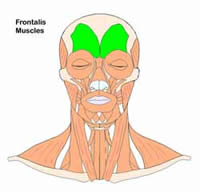 Headaches and Migraine headaches are a very common symptoms of Temporomandibular (TMJ) Disorder. It is common to hear patients report that they feel like there is a vise on their heads or the pressure is unbearable. Many patients take extraordinary amounts of prescription and over-the-counter medication to include Excedrin®, Tylenol® and Advil™ or Ibuprofen searching for relief. Do not be surprised if “medication therapy” only gives slight relief or only temporary relief.
Headaches and Migraine headaches are a very common symptoms of Temporomandibular (TMJ) Disorder. It is common to hear patients report that they feel like there is a vise on their heads or the pressure is unbearable. Many patients take extraordinary amounts of prescription and over-the-counter medication to include Excedrin®, Tylenol® and Advil™ or Ibuprofen searching for relief. Do not be surprised if “medication therapy” only gives slight relief or only temporary relief.
Each year more than 28 million Americans, a majority of them women, suffer from chronic migraine headaches. They must work and spend billions of dollars on medications and other remedies. If you suffer 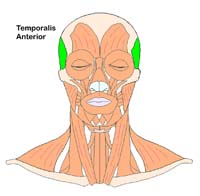 from migraine or tension headaches, they may be caused by your occlusion (bite). The good news is, that if it is your bite that is the cause of your headaches, it is easy to treat and correct. The pain you have in you head and neck could be due to the fact that your jaw is not resting where it wants to be, leaving your jaw muscles in a state of chronic contraction (spasm).
from migraine or tension headaches, they may be caused by your occlusion (bite). The good news is, that if it is your bite that is the cause of your headaches, it is easy to treat and correct. The pain you have in you head and neck could be due to the fact that your jaw is not resting where it wants to be, leaving your jaw muscles in a state of chronic contraction (spasm).
It is the muscles of the temple area of the forehead that play an important role in the posturing and closing of the jaw. The Frontalis, Temporallis Anterior and Temporallis Posterior muscles most likely are in spasm causing excruciating pain. 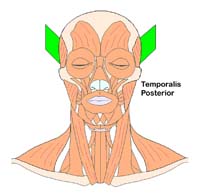 When your occlusion (bite) is not in its proper Neuromuscular alignment, the muscles of the jaw, face and head are overworked and their normal working cycle is disrupted. The headache pain that this disruption may cause can be excruciating.
When your occlusion (bite) is not in its proper Neuromuscular alignment, the muscles of the jaw, face and head are overworked and their normal working cycle is disrupted. The headache pain that this disruption may cause can be excruciating.
TMJ Dentist Virginia Beach
Neck and Shoulder Pain
Many patients experience Neck and Shoulder pain or stiffness related to Temporomandibular (TMJ) disorders. When your teeth and jaw do not fit together properly, there will be an imbalance in the jaw to skull to neck relationship. When the jaw and head or not properly aligned to the body, this abnormality will many times refer pain to the muscles of the neck, shoulder and back.
 When the bite of a patient does not fit correctly, many times the head will not be properly aligned with the spine, as the body tries to compensate for the pain the patient is realizing. We find many times a patient’s head will lean forward which is the body’s response to make the bite feel better and allow the patient’s airway to open more. As you can imagine, as the head leans forward, this causes a tremendous amount of strain on the muscles of the neck, shoulder and upper back. The average weight of a human head is between 12 and 15 pounds. There is much less strain on the muscles of the neck, shoulder and back to hold the head in its anatomically correct position directly above the shoulders.
When the bite of a patient does not fit correctly, many times the head will not be properly aligned with the spine, as the body tries to compensate for the pain the patient is realizing. We find many times a patient’s head will lean forward which is the body’s response to make the bite feel better and allow the patient’s airway to open more. As you can imagine, as the head leans forward, this causes a tremendous amount of strain on the muscles of the neck, shoulder and upper back. The average weight of a human head is between 12 and 15 pounds. There is much less strain on the muscles of the neck, shoulder and back to hold the head in its anatomically correct position directly above the shoulders.
Additionally, many Temporomandibular (TMJ) disorder patients are found to have one shoulder higher than the other. A Neuromuscular Dentist is trained to examine the way the eyes, mouth, head, neck and shoulders are aligned. The vast majority of the time after a patient’s bite is returned to its Neuromuscular position, their alignment of their head and spine return to their anatomically correct position.
Neuromuscular dentists understand that the bones, joints, muscles, and nerves in the face and neck have a complex relationship. They work to correct the bite, relieving strain on the jaw and the surrounding muscles. Once the bite has been aligned, resulting pain in many areas of the body disappears.
Dr. Carol F. Morgan, DDS, can help your pain associated with TMJ disorders whether you live in York County, Williamsburg, Virginia Beach, Norfolk, Portsmouth, Chesapeake, Hampton, Newport News, or any other surrounding city in Hampton Roads.
TMJ Dentist Virginia Beach
Postural Problems
Posture, especially head posture, can also play a significant role in your occlusion. The jaw could be considered one end of your interrelated skeleton, with the feet being the other end. If any part of the skeletal system is affected, it may in turn affect other parts of the system.
One of the most common postural problems found with patients suffering from Temporomandibular disorder is forward head posture. When a patient’s bite (occlusion) is not in its most comfortable Neuromuscular position, the body subconsciously pushes the head forward. One of the most common reasons for this is because the patient has an airway obstruction problem.
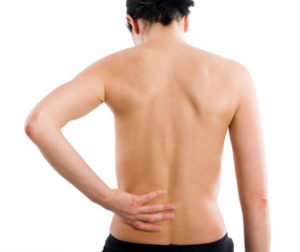 Patients with an airway issue, may find that they snore or breathe through their mouth more often than breathing though their nose. As the head is pushed forward, the airway “opens up” allowing the lungs to more easily inspire air. As a result of the forward head posture, the muscles of the neck, shoulders and upper back are strained causing pain and discomfort. Many patients are found to have trigger points (seriously painful parts of a muscle) in the neck, shoulder (trapezius) and upper back muscles. Chiropractors or physical therapists may assist in the resolution of the trigger points. Your Neuromuscular dentist will address the root cause of the pain, so you will not have the forward head posture and muscles spasms.
Patients with an airway issue, may find that they snore or breathe through their mouth more often than breathing though their nose. As the head is pushed forward, the airway “opens up” allowing the lungs to more easily inspire air. As a result of the forward head posture, the muscles of the neck, shoulders and upper back are strained causing pain and discomfort. Many patients are found to have trigger points (seriously painful parts of a muscle) in the neck, shoulder (trapezius) and upper back muscles. Chiropractors or physical therapists may assist in the resolution of the trigger points. Your Neuromuscular dentist will address the root cause of the pain, so you will not have the forward head posture and muscles spasms.
Neuromuscular dentistry acknowledges the multi-faceted musculoskeletal occlusal signs and symptoms that relates to postural problems involving the lower jaw and cervical region.
Dr. Carol F. Morgan, DDS, can help your back pain and posture problems associated with TMJ disorders whether you live in York County, Williamsburg, Virginia Beach, Norfolk, Portsmouth, Chesapeake, Hampton, Newport News, or any other surrounding city in Hampton Roads.
TMJ Dentist Virginia Beach
Facial Pain
Many patients find themselves massaging their face and jaw to comfort their facial pain. The face has a complex network of nerves, muscles and bones. When a patient’s bite is not properly aligned, the jaw is not properly aligned in the Temporomandibular (TMJ) joint. This can cause a tremendous amount of stress on the muscles and nerves of the face.
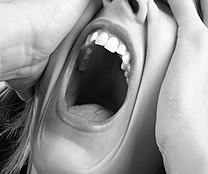 It is easy to understand that when the jaw is not in its proper Neuromuscular position, the muscles of the face try to compensate for the misalignment. The muscles usually go into spasm (an involuntary contraction) and become extremely painful. Facial pain many times makes speaking, eating and breathing difficult. Pain sometimes gets so bad that patients may have limited ability to open their mouths or find that their jaws lock into a limited position.
It is easy to understand that when the jaw is not in its proper Neuromuscular position, the muscles of the face try to compensate for the misalignment. The muscles usually go into spasm (an involuntary contraction) and become extremely painful. Facial pain many times makes speaking, eating and breathing difficult. Pain sometimes gets so bad that patients may have limited ability to open their mouths or find that their jaws lock into a limited position.
We can help facial pain problems by working with the source of the problem. A Neuromuscular Dentist will diagnose, stabilize and realign your bite so that the teeth, muscles, and joints all work together without pain.
Dr. Carol F. Morgan, DDS, can help pain in your face pain associated with TMJ disorders whether you live in Virginia Beach, Norfolk, Portsmouth, Chesapeake, Hampton, Newport News, York County, Williamsburg, or any other surrounding city in Hampton Roads.
TMJ Dentist Virginia Beach
Numbness and Tingling in Arms and Fingers
Temporomandibular disorder affects the nerves and muscles of the face, jaw, neck and shoulders. The nerves of the jaw are very complex and involve nerves and muscles of the neck as well. The affected nerves of the neck can refer shooting pain downs the arms and into the fingers.
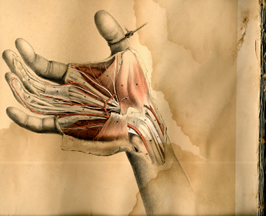 The sternocleidomastoid muscles are anterior muscles in the neck that act to flex and rotate the head. It also acts as an accessory muscle of inspiration, along with the scalene muscles of the neck. The action of the anterior and middle scalene muscles is to elevate the first rib and rotate the neck to the same side.
The sternocleidomastoid muscles are anterior muscles in the neck that act to flex and rotate the head. It also acts as an accessory muscle of inspiration, along with the scalene muscles of the neck. The action of the anterior and middle scalene muscles is to elevate the first rib and rotate the neck to the same side.
The scalene muscles have an important relationship to other structures in the neck. The brachial plexus and subclavian artery pass between the anterior and middle scalenes. The subclavian vein and phrenic nerve pass anteriorly to the anterior scalene as it crosses over the first rib.
When the sternocleidomastoid and scalene muscles are in spasm they can pinch the nerves in the brachial plexis leading down the arms and into the hands, which in turn results in feelings of numbness or tingling.
A Neuromuscular dentist can help you with numbness or tingling in your hands or arms by working with the source of the problem, your bite. Once we have your bite aligned, the muscles affected by the misalignment will be able to go back to their normal function, relieving the spasm and the numbness and tingling that are felt as a result.
Dr. Carol F. Morgan, DDS, can help numbness and tingling in your arms and fingers associated with TMJ disorders whether you live in Virginia Beach, Norfolk, Portsmouth, Chesapeake, Hampton, Newport News, York County, Williamsburg, or any other surrounding city in Hampton Roads.
 There is no question that chronic pain very commonly causes symptoms of depression. Nobody likes to be in pain and unfortunately nobody like to be around somebody who suffers from chronic pain. Patients who suffer from depression many times have problems with their families at home. We commonly hear from a patient’s spouse how the depression affects the home life. There is an unfortunate amount of people who suffer from TMJ that also suffer from depression. The depression so commonly is misdiagnosed or dismissed as having no physical cause. There is also scientific evidence that shows that patients with chronic pain, a condition that nearly all TMJ patients can claim, have chemical changes in the brain as a result of the pain.
There is no question that chronic pain very commonly causes symptoms of depression. Nobody likes to be in pain and unfortunately nobody like to be around somebody who suffers from chronic pain. Patients who suffer from depression many times have problems with their families at home. We commonly hear from a patient’s spouse how the depression affects the home life. There is an unfortunate amount of people who suffer from TMJ that also suffer from depression. The depression so commonly is misdiagnosed or dismissed as having no physical cause. There is also scientific evidence that shows that patients with chronic pain, a condition that nearly all TMJ patients can claim, have chemical changes in the brain as a result of the pain.
 Headaches and Migraine headaches are a very common symptoms of Temporomandibular (TMJ) Disorder. It is common to hear patients report that they feel like there is a vise on their heads or the pressure is unbearable. Many patients take extraordinary amounts of prescription and over-the-counter medication to include Excedrin®, Tylenol® and Advil™ or Ibuprofen searching for relief. Do not be surprised if “medication therapy” only gives slight relief or only temporary relief.
Headaches and Migraine headaches are a very common symptoms of Temporomandibular (TMJ) Disorder. It is common to hear patients report that they feel like there is a vise on their heads or the pressure is unbearable. Many patients take extraordinary amounts of prescription and over-the-counter medication to include Excedrin®, Tylenol® and Advil™ or Ibuprofen searching for relief. Do not be surprised if “medication therapy” only gives slight relief or only temporary relief. from migraine or tension headaches, they may be caused by your occlusion (bite). The good news is, that if it is your bite that is the cause of your headaches, it is easy to treat and correct. The pain you have in you head and neck could be due to the fact that your jaw is not resting where it wants to be, leaving your jaw muscles in a state of chronic contraction (spasm).
from migraine or tension headaches, they may be caused by your occlusion (bite). The good news is, that if it is your bite that is the cause of your headaches, it is easy to treat and correct. The pain you have in you head and neck could be due to the fact that your jaw is not resting where it wants to be, leaving your jaw muscles in a state of chronic contraction (spasm). When your occlusion (bite) is not in its proper Neuromuscular alignment, the muscles of the jaw, face and head are overworked and their normal working cycle is disrupted. The headache pain that this disruption may cause can be excruciating.
When your occlusion (bite) is not in its proper Neuromuscular alignment, the muscles of the jaw, face and head are overworked and their normal working cycle is disrupted. The headache pain that this disruption may cause can be excruciating. When the bite of a patient does not fit correctly, many times the head will not be properly aligned with the spine, as the body tries to compensate for the pain the patient is realizing. We find many times a patient’s head will lean forward which is the body’s response to make the bite feel better and allow the patient’s airway to open more. As you can imagine, as the head leans forward, this causes a tremendous amount of strain on the muscles of the neck, shoulder and upper back. The average weight of a human head is between 12 and 15 pounds. There is much less strain on the muscles of the neck, shoulder and back to hold the head in its anatomically correct position directly above the shoulders.
When the bite of a patient does not fit correctly, many times the head will not be properly aligned with the spine, as the body tries to compensate for the pain the patient is realizing. We find many times a patient’s head will lean forward which is the body’s response to make the bite feel better and allow the patient’s airway to open more. As you can imagine, as the head leans forward, this causes a tremendous amount of strain on the muscles of the neck, shoulder and upper back. The average weight of a human head is between 12 and 15 pounds. There is much less strain on the muscles of the neck, shoulder and back to hold the head in its anatomically correct position directly above the shoulders. Patients with an airway issue, may find that they snore or breathe through their mouth more often than breathing though their nose. As the head is pushed forward, the airway “opens up” allowing the lungs to more easily inspire air. As a result of the forward head posture, the muscles of the neck, shoulders and upper back are strained causing pain and discomfort. Many patients are found to have trigger points (seriously painful parts of a muscle) in the neck, shoulder (trapezius) and upper back muscles. Chiropractors or physical therapists may assist in the resolution of the trigger points. Your
Patients with an airway issue, may find that they snore or breathe through their mouth more often than breathing though their nose. As the head is pushed forward, the airway “opens up” allowing the lungs to more easily inspire air. As a result of the forward head posture, the muscles of the neck, shoulders and upper back are strained causing pain and discomfort. Many patients are found to have trigger points (seriously painful parts of a muscle) in the neck, shoulder (trapezius) and upper back muscles. Chiropractors or physical therapists may assist in the resolution of the trigger points. Your It is easy to understand that when the jaw is not in its proper Neuromuscular position, the muscles of the face try to compensate for the misalignment. The muscles usually go into spasm (an involuntary contraction) and become extremely painful. Facial pain many times makes speaking, eating and breathing difficult. Pain sometimes gets so bad that patients may have limited ability to open their mouths or find that their
It is easy to understand that when the jaw is not in its proper Neuromuscular position, the muscles of the face try to compensate for the misalignment. The muscles usually go into spasm (an involuntary contraction) and become extremely painful. Facial pain many times makes speaking, eating and breathing difficult. Pain sometimes gets so bad that patients may have limited ability to open their mouths or find that their The sternocleidomastoid muscles are anterior muscles in the neck that act to flex and rotate the head. It also acts as an accessory muscle of inspiration, along with the scalene muscles of the neck. The action of the anterior and middle scalene muscles is to elevate the first rib and rotate the neck to the same side.
The sternocleidomastoid muscles are anterior muscles in the neck that act to flex and rotate the head. It also acts as an accessory muscle of inspiration, along with the scalene muscles of the neck. The action of the anterior and middle scalene muscles is to elevate the first rib and rotate the neck to the same side.